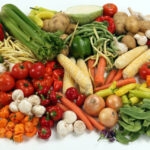KEEPING IT GREEN – EATING FOR BODY AND PLANET
A GREENER NEW YEAR IN THE KITCHEN
New Year is a good time for fresh starts and resolutions. How about adopting environmentally friendly habits for 2019? Looking after our planet is a gift that keeps on giving throughout the year and beyond, and after all, it’s the only one we’ve got.
BUY SUSTAINABLE FOOD Choose locally grown, in-season, plant-based foods with minimal packaging. Foods that are not in season have been transported further, producing more greenhouse gases. Choose more plant-based foods as they have a smaller environmental impact than meat, dairy and eggs. Why not visit your farmers market for the best local and seasonal produce and support local agriculture? Buy fruits and vegetables without plastic packaging – Mother Nature already gave them compostable packaging. Bring your own re-usable bag and skip the receipt if you have no intention of returning your purchases.
REDUCE YOUR FOOD WASTE Food rescue charity Oz Harvest reports that a massive one-third of all food produced globally is wasted! Make a habit of planning your meals each week, buying only what you need and saving your hard-earned money from going to waste. Even better, cook a few plant-based meals on the weekend and freeze them in reusable storage containers to have quick, healthy and sustainable meals on hand for days when you get home late. Invest in some good glass or metal storage containers with lids instead of covering food with plastic wrap. Or clean old peanut butter jars or spaghetti sauce jars and use them to store foods like overnight oats or baked beans. If you are time poor and tend to drop by the local supermarket and pile the trolley on the way home, investigate subscription food boxes or meal delivery services, many of them feature fresh locally grown foods. Choice magazine reviews Australian offerings here.
BE AN ECO-FRIENDLY DINER Disposable plastic plates, cups, straws and cutlery are used for only a few minutes but ultimately spend hundreds of years in landfill. Cutting down on single-use plastic is one of the easiest ways to reduce waste. When eating out, choose to dine inside the restaurant using real reusable tableware rather than ordering take away. If you must have your food on the run, let the restaurant know you don’t require straws, plastic cutlery, napkins, moist towelettes and plastic bags. Keep a reusable coffee cup, water bottle and metal ‘spork’ in your bag instead of using disposables. Leave a reusable plate at work.

BE A BETTER RECYCLER Most of us are already using our council recycling bins to recycle glass and plastic bottles, aluminium cans and paper. But if you have a garden, there are more materials that you can divert from landfill. Fruit and vegetable scraps, tea, corks, eggshells, newspaper and tissues don’t breakdown properly in landfill, but they can be composted! Keep a mini compost bin in your kitchen for easy access; when full, transport it to a larger compost bin or worm farm outdoors where it will eventually turn into free garden fertiliser.
Keep a bag handy in your kitchen or garage and fill it with any soft plastics that can be scrunched into a ball such as bread bags, plastic toilet paper wrapping and rice bags. When full, take it to a supermarket that has a soft plastic collection bin to be recycled. If you are in Australia, Canada or the US, set up some boxes in your garage to collect used cosmetics containers, coffee capsules, toothpaste tubes and postal bags, when full post them to a company like TerraCycle so they can be recycled and used to make park benches and other useful things.
HERE’S A TIP TO HELP YOU STICK WITH YOUR RESOLUTIONS The problem with New Year resolutions is that they all too often fall by the wayside as willpower fades. The key to sticking with them is to create habits you can do on autopilot. Remember that every change starts with a single step, so start with one goal at a time. Once it becomes second nature, choose another. Lose that “all-or-nothing” mindset. And don’t over-commit.
Greener Resolutions in a Nutshell
- To make your resolutions stick, create habits rather than relying on willpower.
- Try one new change at a time rather than an ‘all-or-nothing’ approach.
- Avoid food waste.
- Avoid single-use disposable plastics.
- Recycle as much as you can.
Happy New Year!
Thanks to Rachel Ananin AKA TheSeasonalDietitian.com for her assistance with this article. 
Nicole Senior is an Accredited Nutritionist, author, consultant, cook, food enthusiast and mother who strives to make sense of nutrition science and delights in making healthy food delicious. Contact: You can follow her on Twitter, Facebook, Pinterest, Instagram or check out her website.







